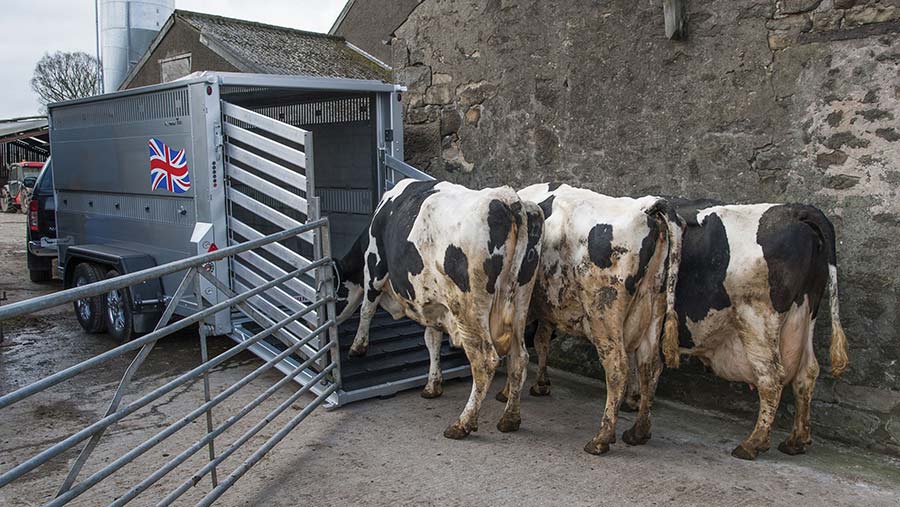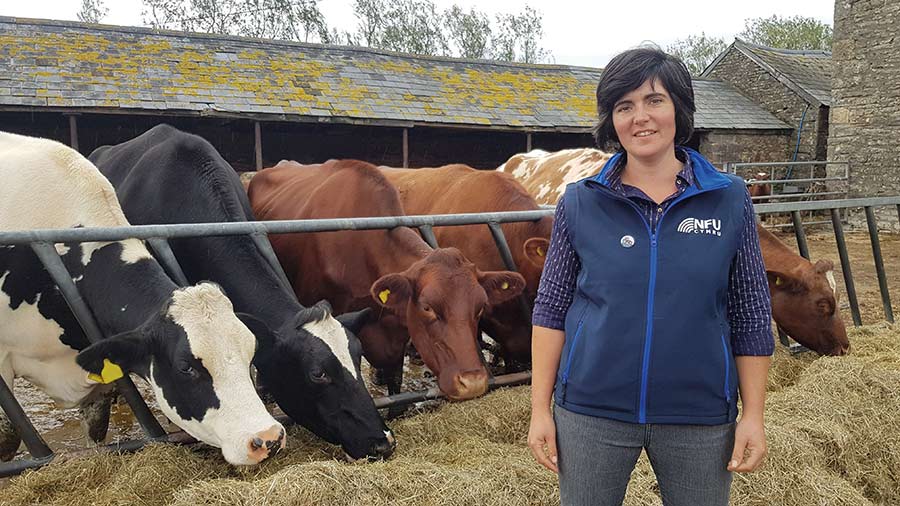Survey reveals full impact of bovine TB on Welsh farmers
 © Alamy Stock Photo
© Alamy Stock Photo Bovine TB is continuing to put an immense financial and mental health strain on farmers in Wales, with the cost of the disease to each farm business averaging more than £25,000 in the past 12 months alone.
NFU Cymru surveyed just over 500 beef and dairy farmers across Wales.
More than one-third of respondents are farming in the region worst affected by the disease – the High TB Area (West), which covers Pembrokeshire and parts of Carmarthenshire and Ceredigion.
See also: New bovine TB management pilot awarded to Pembrokeshire
Of the 101 farms that are currently in a TB breakdown position, 72 have been under restrictions for more than five years, while for 61, the breakdown had lasted for two to five years.
And of the 283 farms that had experienced a breakdown in the past, 35% were in that position for at least two years.
All this is having significant financial and mental health consequences for those involved, with one farmer suggesting that TB was the biggest financial and emotional threat to Welsh agriculture.
Fifteen estimated that TB had cost them more than £200,000, and 22 put that figure at £100,001-£200,000.
Across the 478 farms that responded to this question, the estimated average financial cost in the past 12 months was £25,677. The farms ranged in size, from 30 farms having fewer than 25 cattle, to 83 farms with 501 head or more.
Mental health
The financial burden, together with other worries about the disease, is affecting the mental health of those farmers, as a shocking statistic from the survey indicates.
Of the 462 farmers who agreed to discuss their mental health, 85% said TB had had a negative impact on both them and their whole family.
As one farmer put it: “TB has a devastating effect on the farmer and his family.
“From the worry of the test, the worry of the valuation process, the extreme cruelty of seeing pregnant cows being shot on farm, dragged on a lorry, and wondering when it’s going to stop.”
For another respondent, there was concern about people and cattle getting injured during testing.
“The whole test is so stressful, the worry in case you go down with it, the worry of somebody getting hurt.
“The extra staff you have to pay to help do the test, bringing cattle in and out, and the worry if they are a bit wild and get hurt. All these things cause so much mental worrying.”
Only 55 farmers (12%) said there was no mental health impact, while 13 farmers (3%) preferred not to say.
5 key findings
- 63% of farmers surveyed blame wildlife for TB transmission
- 85% say TB negatively impacts their mental health
- 70% describe Welsh government’s approach to TB eradication as “very poor”
- 72 of the 101 farmers with a breakdown have been in that position for more than five years
- The overwhelming comments from farmers urge the Welsh government to consider a badger cull
How is bovine TB spread and how to control it?
In Wales, the Welsh government has refused to consider culling badgers as part of its overall TB eradication strategy.
This is a source of anger and frustration among farmers who are subjected to some of the strictest cattle controls in the UK, as evidenced in the survey.
When questioned about the factors they believed may influence bovine TB transmission, an overwhelming majority of 451 farmers (89%) were convinced that wildlife had “a strong or extremely strong influence”.
This compared with just 31 farmers who thought cattle-to-cattle transmission had an “extremely strong influence” and 41 who primarily blamed cattle movements.
There were dozens of responses from farmers who wanted the government to take a tougher approach to controlling wildlife as a disease vector.
Control measures
One farmer urged politicians to look at all control measures, writing: “In Wales, we have implemented more stringent controls on cattle movements over the years, and the stats in some areas of Wales are worsening.
“If we don’t control and eradicate the wildlife reservoir, then nothing we will do in the cattle will lessen the effect of TB.”
This sentiment was reflected in other responses to the question “What one thing would you change about bovine TB policy in Wales?”
“Stop authorities pussyfooting around with blaming cattle movements in endemic TB areas where it is obvious that wildlife vectors are the problem.
“Test badger sets and, if positive, do something about it,” wrote one respondent.
“Take out infected wildlife on farm where there is a breakdown. We cannot go on like this. If there was no infection in wildlife, I would accept other causes, but we know full well we are testing one part of the problem,” suggested another.
Government performance
The farmers were asked to rate the Welsh government’s performance on bovine TB eradication, and the results will not make pleasant reading for the administration.
Only two farmers thought the government was doing a “very good” job, and 17 thought it was “fairly good”. But the vast majority – 353 farmers (70%) – thought its performance was “very poor”.
One farmer appealed for the politics to be taken out of TB eradication, while another expressed exasperation at the programme.
“Quite honestly, I don’t know what else we as farmers – who have been under TB restriction since 2008 and have lost approaching 1,000 head of livestock – can do,” they wrote.
“But I do know that we are not going to test our way out of this situation. To be constantly testing and removing animals is getting us nowhere.
“Doing the same thing year after year and expecting a different outcome is the definition of madness.”
More than one-third of farmers wanted the government and the Animal and Plant Health Agency (Apha) to change the tone of the letters sent to farmers to “make them more farmer friendly”.
What NFU Cymru says
NFU Cymru deputy president Abi Reader has described the anguish captured in the survey and being felt by Welsh farming families, as a result of bovine TB breakdowns, as “heartbreaking”.
The results, she said, highlight the lack of confidence those farmers feel in the Welsh government’s approach to bovine TB eradication – particularly “the overwhelming frustration that politics continues to override scientific evidence when it comes to tackling the reservoir of disease in the wildlife population”.
There is a common trend among respondents that they don’t feel that Welsh government is listening to, or fully understanding, their plight, she says.
“It is clear from the unanimous voice in our survey that Welsh government cannot ignore the mental health impact the current policy is having on rural communities and those working in the allied industries,” said Ms Reader.
“For so many farmers, despite their best efforts, it feels that there is no light at the end of the bovine TB tunnel – this needs to change.”
The union, she pledged, would continue its strong lobbying of the government for an “effective eradication policy that brings to an end the suffering bovine TB is causing to cattle, wildlife and farming families.”

Abi Reader © NFU Cymru
What the Welsh government says
The Welsh government insisted that there was no evidence that culling badgers would “significantly help our goal of TB eradication”.
Ruling out a badger cull, it also suggested that cattle-to-cattle transmission rates were greater than badger-to-cattle infection.
“There has been steady progress since 2009, with fewer affected herds and new incidents,” said a spokesman.
“However, we do see variations in TB levels in different parts of Wales, requiring continued action to tackle the disease.”
The government said it was “very aware” of the challenge of TB in cattle, and the distress it can cause for farmers.
“This is why we are determined to eradicate bovine TB in Wales as set out in our Delivery Plan, published earlier this year.
“We are also providing ongoing assistance to farmer support and mental health networks.”
